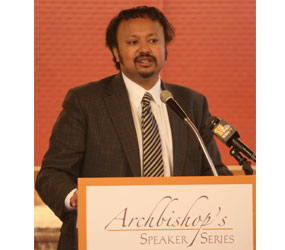Each year, Catholic schools in the Archdiocese of Baltimore save Maryland taxpayers more than $380 million in per pupil expenses and provide an additional $393.3 million to the local economy in income and revenue.
That was the message of Sage Policy Group CEO Anirban Basu, during the Archbishop’s Speaker Series Jan. 13 at the Center Club inside the former Baltimore City home of Legg Mason. The lecture, called “Catholic Education: Why It Should Matter to the Baltimore Business Community,” was delivered to business and community leaders and was the first in the Archbishop’s Speaker Series.
Archbishop Edwin F. O’Brien is expected to host several more talks throughout the year to community and business leaders, according to Sean Caine, communications director for the archdiocese. Caine said the talks could be held in communities throughout the archdiocese.
Basu, a member of the newly formed Archdiocesan School Board, prepared an independent study last year that analyzed the economic impact of Catholic schools.
“This is a really a period of re-birth for the archdiocese’s school system,” Basu said.
The study came as the archdiocese was addressing declining enrollment last year.
The package found a favorable comparison in Catholic schools’ graduation rates over those of public schools, noting double-digit increases for students across all ethnic and socio-economic backgrounds. Catholic schools had a graduation rate 17 percent higher than their public school counterparts in urban settings.
Figures show 47.6 percent of Maryland high school seniors attended a four-year college in 2009, while more than 81 percent of Catholic school graduates entered a four-year college. Catholic high schools in the archdiocese graduated 100 percent of their seniors, with a full 97 percent entering four or two-year colleges.
Basu said that Catholic school graduates also netted $114.1 million in financial awards in scholarships after the 2008-09 school year. Catholic school graduates, over a 10-year period, will earn $5.2 billion more than the same number of public school graduates.
“Catholic school graduates can expect to earn roughly $225,000 (in 2008 dollars) more than their public school counterparts,” over their earning careers, Basu said.
Basu said that Catholic school students produce higher test scores, support more jobs, income formation and business sales in the broader economy. Basu pointed out that numerous public servants and community leaders came from Catholic schools.
“I don’t think that is an accident,” Basu said.
Basu said the schools serve as stabilizing forces in older communities.
As the archbishop concluded the program, he reminded the community and business leaders of the transforming landscape of Catholic education. He talked about longtime dedication of the clergy and religious to schools.
“Probably for the first time in our great history, pastors aren’t going to do it. Nuns aren’t going to do it,” the archbishop said. “It’s up to you. It’s not going to be easy. It’s essential that we keep this going.”


